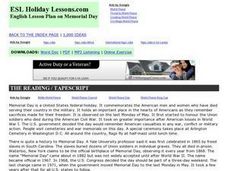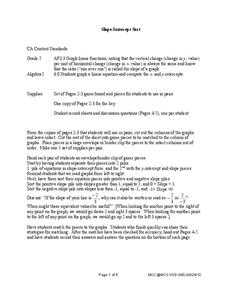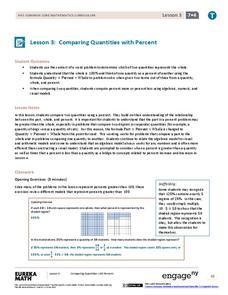Willow Tree
Number Properties
The number of basic algebraic properties can become overwhelming for learners. A lesson explains and gives examples for all the basic algebraic properties. The resource is perfect to use as a way for pupils to organize and...
Nevada Outdoor School
Let It Snow! Let It Melt!
Winter weather offers a great opportunity to teach young scientists about the states of matter. This activity-based lesson includes a range of learning experiences, from experimenting with the rate at which ice melts...
University of California
Hot! Hot! Hot!
Calories are not tiny creatures that sew your clothes tighter every night, but what are they? A science lesson, presented at multiple levels, has learners experiment with heat, heat transfer, and graph the function over time....
August House
Anansi Goes to Lunch - Pre-Kindergarten
In a multidisciplinary lesson plan, you will focus your instruction around the West African folktale, Anansi Goes to Lunch by Bobby and Sherry Norfolk while your little learners sing songs, play games, participate in a grand...
Serendip
Photosynthesis and Cellular Respiration
How does energy from the sun make plants grow? Scholars move step by step through the processes that promote plant propagation during a detailed lesson. The resource illustrates ADP production and hydrolysis, then allows learners to...
National Security Agency
Awesome Area - Geometry and Measurement
Break out those math manipulatives, it's time to teach about area! Capturing the engagement of young mathematicians, this three-lesson plan series supports children with learning how to measure the area of squares, rectangles, and...
California Mathematics Project
Meteorology
See how estimation is essential to making temperature weather maps. Scholars use ratios and rates of change to estimate temperatures at locations where temperature readings have not been made. They connect this idea to linear functions.
Sea World
Endangered Species
Study different endangered species with several activities that incorporate math, science, language arts, and research strategies. A great addition to your lesson on conservation or Earth Day.
WindWise Education
How Does a Windmill Work?
Can my windmill pick up a weight? Given the same set of materials, groups design and build the most efficient windmill. On the first day, groups concentrate on getting a windmill to spin, while on the second day, they modify their...
It's About Time
Reflected Light
The lesson allows young scientists to use lasers and mirrors to study reflected light. A reading passage and homework question assess learning, while additional material introduces extension activities.
Curated OER
ESL Holiday Lessons: Memorial Day
Improve language skills by having your class read an article about Memorial Day. After reading, they respond to 6 matching questions, 29 fill-in-the-blank questions, 30 multiple-choice questions, 12 word-scramble questions, 30...
EngageNY
The Slope of a Non-Vertical Line
This instructional activity introduces the idea of slope and defines it as a numerical measurement of the steepness of a line. Pupils then use the definition to compare lines, find positive and negative slopes, and notice their...
Laboratory for Atmospheric and Space Physics
Looking to the Future
New Horizons set forth on a mission to Pluto in 2006. Ten years later, the spacecraft is still on its way. Here, enthusiastic scholars predict what they will be like—likes, dislikes, hobbies, etc.—when New Horizons arrives at its...
Teach Engineering
Show Me the Money
Class members learn how to estimate the total costs involved to design and build a bridge by including design, material, equipment, and labor costs. The activity includes a discussion about the trade-off between cost and aesthetics.
Curated OER
Chemical Reactions
In this chemical reaction worksheet, learners investigate the results of mixing calcium chloride with sodium bicarbonate. They observe the chemical and physical changes that occur, identify the properties of the chemical before and after...
EngageNY
Markup and Markdown Problems
There is a 100 percent chance this resource will help pupils connect percents to financial literacy. Young mathematicians use their knowledge of percents to find markups and markdowns in financial situations in the seventh segment in a...
Curated OER
Changing Crust
In this changing crust worksheet, students use candy bars, licorice sticks and bubble gum to simulate the 3 types of forces that change the Earth's crust. These include compressional forces, tensional forces and transversal forces. The...
Curated OER
Energy Changes, Rates of Reactions, Nuclear Chemistry
In this energy changes, rates of reactions and nuclear chemistry worksheet, learners solve 14 problems to review concepts about endothermic and exothermic reactions, heat of combustion, heat of reactions, enthalpy, kinetic and potential...
UAF Geophysical Institute
Carbon Footprint
Your young environmentalists can calculate their carbon footprint and discuss ways to reduce it with a worksheet about climate change. After reading a handout about what impact one's carbon footprint can have on the environment, kids...
West Contra Costa Unified School District
Slope-Intercept Sort
What's so special about slope? Pupils first match cards with slope and y-intercept to graphs of linear equations. They continue the lesson by matching equations in slope-intercept form to the same graphs.
North Carolina State University
Silly Stuff
It's time to get a little silly with this fun primary grade science activity. By simply combining two liquids, white glue and corn starch, a strange solid is formed, commonly known as silly putty. To ensure everything goes smoothly,...
Federal Reserve Bank
Financial Fables: Shopping Wisely with Olivia Owl
Cover two subjects with one lesson! First, dive into English language arts; read an eBook, answer comprehension questions, and complete a cause and effect chart about the financial fable, Shopping Wisely with Olivia Owl. Then, take...
NASA
The Case of the Wacky Water Cycle
Join the tree house detectives in learning about the processes of the water cycle, water conservation, water treatment, and water as a limited resource.
EngageNY
Comparing Quantities with Percent
Be 100 percent confident who has the most and by how much. Pupils use percentages to help make the comparisons by finding what percent one quantity is of the other. They also determine the percent differences between the two...

























